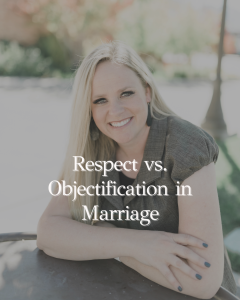
Men and women have been conditioned to think that the word “objectifying” is bad. True, it can feel unsettling but sexual relationships thrive when there is a sense of desire – a longing for one another that includes, but isn’t limited to, physical attraction. So, how do we navigate the tension between desire and respect? How do we balance celebrating our spouse’s physical presence without reducing them to just a body? That’s what we’re going to talk about today.
Show Summary:
Let’s begin with a question that might not come up in everyday conversation but is central to many marriages: What does it mean for your spouse to be the object of your sexual desire?
For many of us, the word object feels unsettling. It can imply a lack of humanity, turning someone into something to be used rather than someone to be cherished. And yet, sexual relationships thrive when there’s a sense of desire—a longing for one another that includes, but is not limited to, physical attraction. So, how do we navigate the tension between desire and respect? How do we balance celebrating our spouse’s physical presence without reducing them to just a body? That is what we are going to talk about today.
Why Your Spouse Doesn’t Want to Feel Like Just an Object
No one wants to feel reduced to their physical features. When someone feels like they’re only valued for their body, it can deeply impact their sense of self-worth and connection in the relationship. Imagine if every interaction focused only on their looks—compliments only on their figure, touch that feels more like a transaction or an extraction rather than affection, or an absence of acknowledgment for their thoughts, feelings, and efforts.
When this happens, your spouse might feel emotionally disconnected from you, as though they’re a tool for your pleasure rather than a partner in intimacy. For example, if a wife hears only about how “sexy” she looks but rarely about how thoughtful she is or how her laughter lights up the room, she may wonder if her physical appearance is the only thing holding her husband’s interest. This can create insecurity and even resentment, making her feel unseen and undervalued.
On the other hand, being viewed as just an object can also create pressure. Your spouse might feel they need to meet impossible physical standards or always “perform” to keep your attraction alive. This is a heavy burden that often leaves them feeling inadequate, even if your intentions are well-meaning.
Why Your Spouse Does Want to Be Desired
While no one wants to feel like just an object, there’s also a strong desire to feel wanted and appreciated physically. It’s a powerful affirmation to know your partner finds you attractive, craves your presence, and feels drawn to your body. This kind of desire communicates, I see you, I want you, and I choose you.
Being desired can be deeply validating. Think about how much confidence it brings when your spouse says something like, “You look incredible in that outfit,” or when they can’t help but pull you close because they’re captivated by you. These moments don’t just communicate attraction—they build connection.
For example, consider how exciting it feels when your partner gives you a lingering look or touches you in a way that says they can’t keep their hands off you. It’s playful, affirming, and creates a spark that reminds you both why you fell in love in the first place. Desire doesn’t have to be grand or dramatic. Sometimes, it’s as simple as a whispered, “I love the way your body feels next to mine,” in the quiet of the night.
How Over-Correcting Leads to Disconnection
In trying to avoid objectifying their spouse, many people go too far in the opposite direction. They become so cautious about not focusing on physical attraction that they fail to express desire altogether. This can lead to its own set of problems, as it leaves a void where connection and affirmation should be.
Imagine a husband who has learned that focusing on his wife’s body could make her feel uncomfortable, so he stops saying anything about how beautiful or sexy he finds her. His silence may come from a place of respect, but over time, his wife might start to wonder, Does he still find me attractive? Am I still desirable to him?
This kind of over-correction often stems from societal conditioning. We’ve been taught to avoid shallow or surface-level compliments, and while this is well-intentioned, it can strip the relationship of playfulness and excitement. Your spouse needs to hear that you love their body, their curves, their strength—whatever it is about them that makes you light up. Without these affirmations, the sexual relationship can feel sterile, devoid of passion or spontaneity.
Healthy Objectification as Affirmation
Let’s reframe objectification in this context. It’s not about reducing someone to a body or a thing, but rather about celebrating their physical presence in a way that complements their emotional and spiritual qualities. When desire is rooted in love and mutual respect, it becomes a form of affirmation, a way of saying, I see you and all of you captivates me.
This can look like expressing what you love about their physical features in specific, sincere ways. Instead of a generic, “You look good,” try something more personal. For example, “I love the way your freckles come out in the sun,” or “The way you smile at me makes my heart skip a beat.” These compliments don’t just focus on appearance—they connect your feelings to what you see.
It can also include physical gestures: a lingering touch, a passionate kiss, or even a playful pinch as you walk past. These actions say, I’m drawn to you, in a way that feels genuine and fun. There is an energy behind all of our touch, so just make sure that the touch is consensual and that it isn’t touch to extract but to communicate lovingly.
How to Express Desire Well
Balancing desire with respect is an art, and it takes intentionality. Start by focusing on your spouse as a whole person. Your expressions of admiration should encompass both who they are and what they look like. For example, tell your spouse, “I love the way your laughter fills the room,” just as often as you say, “I can’t stop thinking about how good you looked in that dress last night.”
Be specific in your compliments, and let them know how their physical presence affects you emotionally. For instance, you might say, “When you held my hand this morning, it made me feel so safe and loved,” or “Seeing you dance last night reminded me of how lucky I am to have you in my life.” These kinds of comments make your spouse feel valued in a way that goes beyond the surface.
Also, remember that actions often speak louder than words. Non-sexual touch, quality time, and acts of service all reinforce the message that your desire is part of a deeper connection.
What This Can Create in Your Relationship
When you strike the right balance, something magical happens in your relationship. Your spouse feels seen, loved, and desired in a way that deepens intimacy and builds trust. They know you’re drawn to their body, but they also know that your desire stems from who they are as a person.
This creates a space for playfulness and spontaneity, where the relationship doesn’t just feel like a partnership—it feels like a romance. Desire becomes a shared experience, something that connects you both on multiple levels.
The Conditioning Around Desire
Cultural and societal messages shape the way men and women approach desire and attraction. Many men have been taught to avoid objectifying women, which is good in theory but can lead to suppressing healthy expressions of admiration. They might hesitate to say anything for fear of being inappropriate, but this can make their partner feel unseen.
Women, on the other hand, may be conditioned to feel shame about being desired or to downplay their own beauty. They might deflect compliments or feel uncomfortable when their partner expresses admiration. They might also misread his intentions based on this conditioning. So understanding these dynamics and where your partner is coming from can help couples communicate more openly about what feels good and affirming for both partners.
Final Thoughts: Finding the Balance
Sexual desire isn’t just about the physical; it’s a blend of attraction, admiration, and love. When expressed with intention and balance, it becomes a way to celebrate your spouse’s body and soul, fostering a connection that’s deeply fulfilling for both of you.
So here’s my challenge for you: This week, take a moment to tell your spouse what you love about their body and who they are as a person. Let them know how their presence—physical, emotional, and spiritual—makes you feel. See how it transforms your connection and brings new energy to your relationship.
Remember, love is a journey, not a destination. Stay committed, stay passionate, and stay connected. Goodbye for now.
Happy New Year




This is a brilliant article, thank you. But can you write it flipped over please? Where the woman fears she is objectifying her male spouse? Or when society shames a women (and calls her all manner of unpleasant names) for having a high libido and desiring sex with her spouse? Because there is that form of over-correcting too.
I think you can take a lot of what I have said and apply it to the higher desire wife.